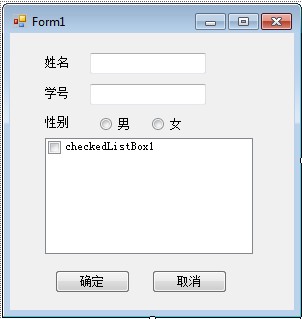C#简单生成随机密码的方法示例
时间:2022-11-26本文实例讲述了C#简单生成随机密码的方法。分享给大家供大家参考,具体如下:
using System;
using System.Data;
using System.Configuration;
using System.Web;
using System.Web.Security;
using System.Web.UI;
using System.Web.UI.WebControls;
using System.Web.UI.WebControls.WebParts;
using System.Web.UI.HtmlControls;
using System.Windows.Forms;
public partial class _Default : System.Web.UI.Page
{
public static int counter = 0;
protected void Page_Load(object sender, EventArgs e)
{
}
public static string MakePassword(string pwdchars, int pwdlen)
{
//判斷隨機密碼的長度
string tmpstr = "";
int iRandNum;
if (pwdlen > pwdchars.Length)
{
return "长度过长!" + pwdchars.Length;
}
Random rnd = new Random();
for (int i = 0; i < pwdlen; i++)
{
iRandNum = rnd.Next(pwdchars.Length);
tmpstr += pwdchars[iRandNum];
}
return tmpstr;
}
protected void Button1_Click(object sender, EventArgs e)
{
int t1 = Convert.ToInt32(TextBox1.Text);
if (t1 < 10 || t1 > 20 || t1 < 0)
{
MessageBox.Show("指定密碼失敗!");
}//判斷指定的密碼長度是否符合
else
{
string randomchars = "abcdefghijklmnopqrstuvwxyz~!@#$%^&*()_+|0123456789~!@#$%^&*()_+|ABCDEFGHIJKLMNOPQRSTUVWXYZ~!@#$%^&*()_+|";
string password = MakePassword(randomchars, Convert.ToInt32(TextBox1.Text));
TextBox2.Text = password;
}//產生隨機的密碼值
}//判斷輸入的密碼是否符合隨機產生的密碼
protected void Button2_Click(object sender, EventArgs e)
{
if (TextBox3.Text.Trim()==TextBox2.Text.Trim())
{
MessageBox.Show("成功!");
Response.Write("您現在的密碼是:"+"<font color=red>"+TextBox3.Text+"</font>");
}
else
{
MessageBox.Show("失败!");
}
}
protected void TextBox1_TextChanged(object sender, EventArgs e)
{
}
}
HTML代码:
<%@ Page Language="C#" AutoEventWireup="true" CodeFile="Default.aspx.cs" Inherits="_Default" %>
<!DOCTYPE html PUBLIC "-//W3C//DTD XHTML 1.0 Transitional//EN" "http://www.w3.org/TR/xhtml1/DTD/xhtml1-transitional.dtd">
<html xmlns="http://www.w3.org/1999/xhtml" >
<head id="Head1" runat="server">
<title>无标题页</title>
</head>
<body bgcolor="#66ffcc">
<form id="form1" runat="server" >
<div>
<br />
<br />
<br />
<br />
<br />
<br />
<table bgcolor=SpringGreen>
<tr>
<td width="100px">
<asp:Label ID="Label1" runat="server" Text="指定密码长度(10~20之間)" Width="129px"></asp:Label></td>
<td width="159px">
<asp:TextBox ID="TextBox1" runat="server" Width="39px" OnTextChanged="TextBox1_TextChanged">10</asp:TextBox>
<asp:TextBox ID="TextBox2" runat="server" Width="195px" ReadOnly="true"></asp:TextBox></td>
<td width="103px">
<asp:Button ID="Button1" runat="server" OnClick="Button1_Click" Text="產生密碼" /></td>
<td width="100px">
</td>
</tr>
<tr>
<td width="100px">
<asp:Label ID="Label2" runat="server" Text="输入产生的密码"></asp:Label></td>
<td width="159px">
<asp:TextBox ID="TextBox3" runat="server" Width="261px" TextMode="Password"></asp:TextBox></td>
<td width="103px">
<asp:Button ID="Button2" runat="server" OnClick="Button2_Click" Text="验证" /></td>
<td width="100px">
</td>
</tr>
</table>
<br />
<br />
<br />
</div>
</form>
</body>
</html>
PS:这里再为大家提供两款功能类似的在线工具供大家参考:
在线随机数字/字符串生成工具:
http://tools.html5code.net/aideddesign/suijishu
高强度密码生成器:
http://tools.html5code.net/password/CreateStrongPassword
更多关于C#相关内容还可查看本站专题:《C#字符串操作技巧总结》、《C#数据结构与算法教程》、《C#常见控件用法教程》、《WinForm控件用法总结》、《C#程序设计之线程使用技巧总结》、《C#数组操作技巧总结》及《C#面向对象程序设计入门教程》
希望本文所述对大家C#程序设计有所帮助。
相关文章
 C# SendMail发送邮件功能实现这篇文章主要为大家详细介绍了C# SendMail发送邮件功能实现,具有一定的参考价值,感兴趣的小伙伴们可以参考一下
C# SendMail发送邮件功能实现这篇文章主要为大家详细介绍了C# SendMail发送邮件功能实现,具有一定的参考价值,感兴趣的小伙伴们可以参考一下 C#实现的SQL备份与还原功能示例这篇文章主要介绍了C#实现的SQL备份与还原功能,结合具体实例形式分析了C#操作数据库实现SQL备份与还原相关的控件、
C#实现的SQL备份与还原功能示例这篇文章主要介绍了C#实现的SQL备份与还原功能,结合具体实例形式分析了C#操作数据库实现SQL备份与还原相关的控件、 C#使用checkedListBox1控件链接数据库的方法示例这篇文章主要介绍了C#使用checkedListBox1控件链接数据库的方法,结合具体实例形式分析了数据库的创建及checkedListBox1控
C#使用checkedListBox1控件链接数据库的方法示例这篇文章主要介绍了C#使用checkedListBox1控件链接数据库的方法,结合具体实例形式分析了数据库的创建及checkedListBox1控 C#实现的sqlserver操作类实例这篇文章主要介绍了C#实现的sqlserver操作类,结合具体实例形式分析了C#针对sqlserver数据库进行连接、查询、更新、关闭
C#实现的sqlserver操作类实例这篇文章主要介绍了C#实现的sqlserver操作类,结合具体实例形式分析了C#针对sqlserver数据库进行连接、查询、更新、关闭 C#多线程数组模拟socket这篇文章主要为大家详细介绍了C#多线程数组模拟socket的相关代码,具有一定的参考价值,感兴趣的小伙伴们可以参考
C#多线程数组模拟socket这篇文章主要为大家详细介绍了C#多线程数组模拟socket的相关代码,具有一定的参考价值,感兴趣的小伙伴们可以参考 C#根据http和ftp图片地址获取对应图片这篇文章主要为大家详细介绍了C#根据http和ftp图片地址获取对应图片,具有一定的参考价值,感兴趣的小伙伴们可以
C#根据http和ftp图片地址获取对应图片这篇文章主要为大家详细介绍了C#根据http和ftp图片地址获取对应图片,具有一定的参考价值,感兴趣的小伙伴们可以